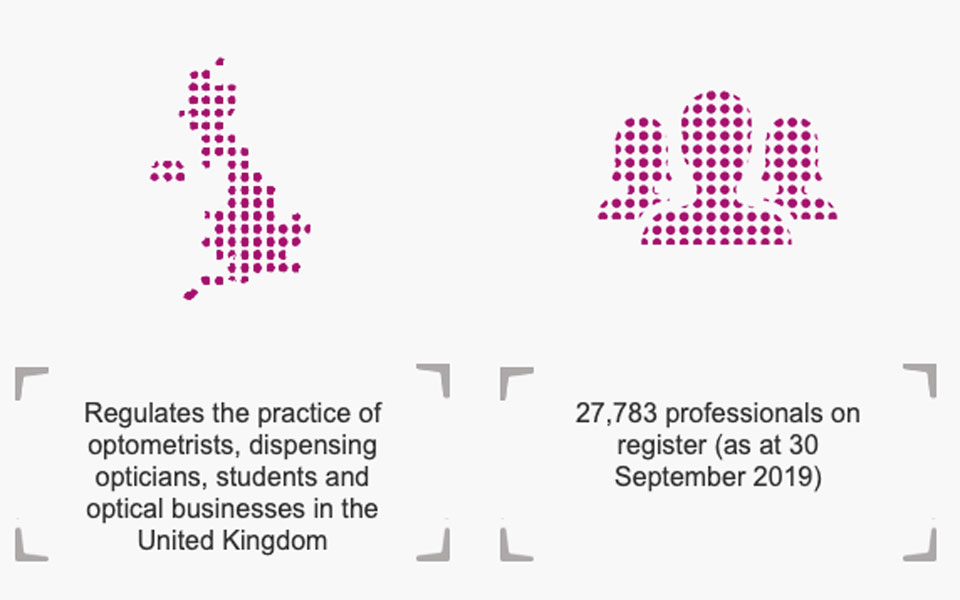- OT
- Professional support
- Optical organisations
- Professional Standards Authority's review of GOC highlights areas for improvement
Professional Standards Authority's review of GOC highlights areas for improvement
Regulator does not meet standards related to the timeliness of FTP cases and communication of FTP decisions

07 May 2020
The Professional Standards Authority (PSA) has announced that the General Optical Council (GOC) met 22 of the 24 Standards of Good Regulation, as part of its annual review of the regulator’s performance for 2018-19.
The PSA said that the GOC met all the relevant standards for Guidance and Standards, Education and Training, and Registration, but concluded that only eight out of the 10 standards for Fitness to Practise (FTP) were met.
Highlighting the timeliness of FTP cases, the PSA said that this standard had not been met by the GOC since 2014-15, and was again not met in the 2018-19 period.
“We have been concerned over a number of years about the length of time taken for the GOC to progress cases through the FTP process. The statistical information we collect about timeliness in FTP did not show a significant improvement overall from last year. We acknowledge that the GOC remains committed in taking action aimed at addressing the ongoing issues with timeliness, has put targets in place designed to improve timeliness and is closely monitoring progress against those targets. However, although the GOC has advised that it has projects underway with the aim of improving timeliness, these have not yet demonstrated a significant impact on the time it takes to conclude cases. Therefore, this Standard is not met,” the report stated.
The PSA was also critical of the communication of FTP decisions by the GOC. The report stated in its targeted review of delays in disclosing final FTP decisions, the GOC failed to provide the PSA with outcomes of two FTP decisions within a reasonable time. There was also a further instance of delay shortly after the end of the PSA review period.
The PSA concluded that this “suggested there may still be difficulties at the GOC in this area. The potential impact of such delays on our ability to properly scrutinise a case poses a real risk to undermine our ability to protect the public and fulfil our statutory objective.”
Although the GOC has advised that it has projects underway with the aim of improving timeliness, these have not yet demonstrated a significant impact on the time it takes to conclude cases
The PSA’s report noted the GOC’s commitment to improve the timeliness of FTP cases as part of its Strategic Plan for 2020-25, which includes upgrading its case management system, improving communication with NHS regional contacts and businesses, and introducing case management hearings.
The Authority also noted the improvements the GOC made to ensure information on its register is easily accessible in order to meet the third Registration standard, which the GOC had not met last year.
In the annual report from the PSA in 2017-18, the GOC did not meet standards related to data errors on its register and the time that it takes to process fitness to practise complaints.
Continuing to make progress
GOC chief executive and registrar, Lesley Longstone, said: “We welcome the Authority’s report and are pleased that they have recognised our commitment to improving our FTP processes. We know this is an area which requires continuous improvement and we have put several measures in place in our ‘Fit for the future’ Strategic Plan for 2020-25 to address this. These measures will take some time to have an impact, but we have already seen shorter times for FTP cases to be heard due to removal of the cap on hearings panel members, which has allowed us to hold more hearings simultaneously.”
She added: “We have also made improvements to the quality of data on our register of optometrists and dispensing opticians, which has been recognised by the Authority. We look forward to continuing to make progress with our FTP processes so we can fulfil our regulatory role of protecting the public to the best of our ability.”

Legal and regulatory director at the AOP, Ella Franci, told OT: “As the 2018-2019 annual report explains, the GOC have put in place some new initiatives to try and improve its FTP processes, however it is too early to see the results of these and fully assess the impact of those changes at this current time. Something that continues to have a notable impact on our members, and therefore cause for concern at the AOP, is the length of time it is taking for FTP matters to be concluded and the very high number of legacy cases. These continue to increase, and with substantive hearings now impacted by coronavirus (COVID-19) it is likely to be some time before there is any significant reduction.
“We’re also disappointed that no cases have been concluded during the relevant period, or indeed outside it, using Alternative Panel Disposal – a missed opportunity that we hope to see rectified shortly now that cases are once again being put forward under this policy.”
Ms Franci added: “We are pleased that the AOP and GOC do now have good lines of communication open and, where we have raised concerns, are starting to see some benefit for our members. We will continue to work with the GOC on the key areas.”
Advertisement


Comments (0)
You must be logged in to join the discussion. Log in